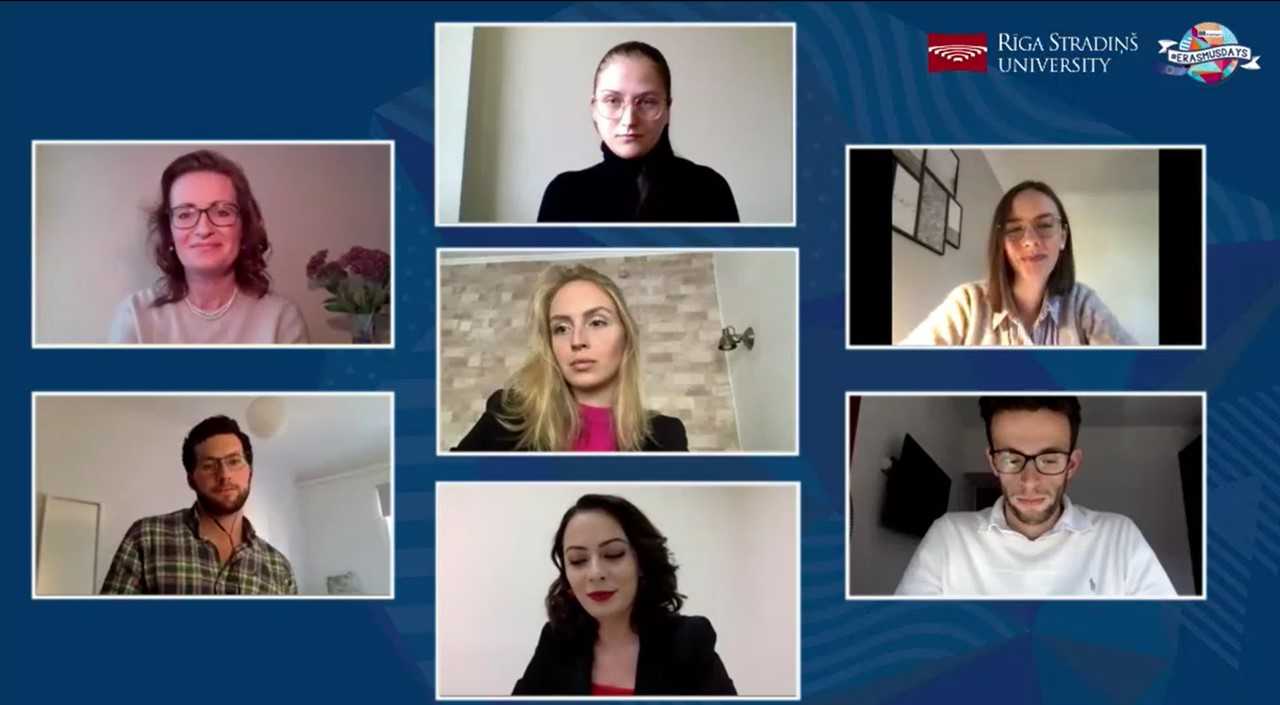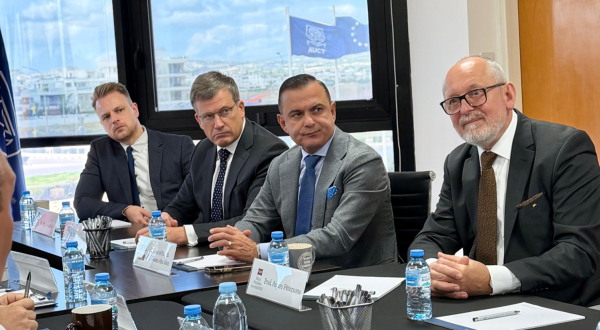Focus on Mobility and COVID-19 on Erasmus Day
Rīga Stradiņš University (RSU) Erasmus Day 2021 took place online on 14 October and was attended by 400 Erasmus+ participants and other interested parties from more than 10 countries. The event acted as a reminder about the importance of the Erasmus+ programme, which has provided numerous opportunities for RSU students and staff to successfully integrate into the European Higher Education Area.
The interactive online database created by the RSU International Department was presented at the beginning of the event. The database gathers RSU mobility participants’ experiences at partner universities in Europe.
‘The database is intended for students who are planning to take advantage of the wide mobility opportunities.
Erasmus coordinators at universities cannot provide information based on first-hand experiences, so we designed the database which gives students access to other students’ experiences directly. We included practical aspects such as funding, living costs, study plans and contracts, accommodation, as well as social aspects. The students’ accounts are accompanied by photographs. Anyone can use the database search function to find information based on criteria that are relevant to them. The database is open and accessible to everyone and will be updated regularly,’ says Maruta Funta, International Relations Manager at the RSU International Department.
A discussion about mobility during the COVID-19 Pandemic took place in the second part of the day. Participants included students from RSU and partner universities: Sofia Bunin (a student from the RSU International Student Department), Diogo Ferraro (an exchange student from the Faculty of Medicine, University of Coimbra), Sintija Kukaine (a student from the RSU Faculty of Medicine), Ketevan Kukhianidze (Associate Professor at Akaki Tsereteli State University and a post-doctoral researcher at the RSU Faculty of European Studies), Ilze Mileiko (a graduate of the RSU Faculty of Communication), and Pietro Speciale (a student from the RSU International Student Department). The discussion was moderated by Baiba Pētersone, Director of the International Department.
The discussion focused on the impact that the pandemic has had on mobility and the future development of international exchange. Participants acknowledged that international exchange has always been challenging, because it forces you to step out of your comfort zone, but the pandemic has been particularly demanding in terms of adaptability, forcing mobility participants to adjust to different study formats and living constraints.
Mobility participants appreciate the support they have received from both their home and host universities and feel that the need for this support has increased during the pandemic. The flexibility of both universities is also an issue, as is their ability to cooperate in explaining various internal processes to exchange students.
The participants of the discussion emphasised how important digital skills and different platforms were when transitioning to online learning. Young people who see themselves as the digital generation say that it’s been easy for them to learn the new digital solutions necessary to study online, and that universities have provided the necessary digital infrastructure.
Although the participants of the discussion believe that the desire to gain international experience is a motivator for overcoming various challenges, they have considered factors such as COVID-19 infection rates in the country of the partner university, national restrictions, vaccination rates, the willingness of the host university to support exchange students, and other questions before going on their exchange.
When analysing the future development of Erasmus+ and other exchange programmes, expanding digital elements is always mentioned which would reduce the environmental impact of mobility programmes, promote the development of digital infrastructure, and increase opportunities. The participants’ experience shows that remote learning has made mobility possible during the pandemic and that universities should continue to develop a blended-mobility approach after the pandemic. However, they emphasised the need for physical mobility, which ensures the in person effect. Mobility is not just about studying. It includes learning about other cultures and developing social competences. Even being in the country where your exchange university is although you are studying remotely is seen as a significant learning experience.
‘Ever since the beginning of the pandemic, the International Department has sought to ensure continuity of the Erasmus+ programme. This discussion shows that mobility participants appreciate the support they have received from Erasmus coordinators both at RSU and at our partner universities.
During this time, it has been particularly important to work with each student, paying attention to their individual situations in very unpredictable circumstances.
Regular and in-depth communication with partner universities has made it possible to identify the situation of each university and country, thus ensuring the possibility of international exchange at a time when the global movement was almost at a standstill,’ said Pētersone.
RSU Erasmus Day 2021 video recording in English
Erasmus Days is an event initiated by the European Commission and the French National Agency for Erasmus+, which takes place in different countries around the world every October.





